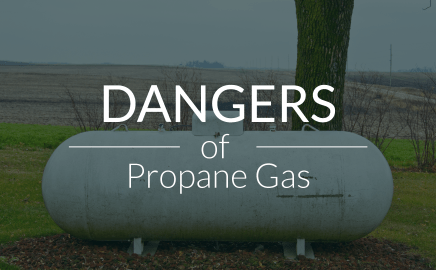Dangers of Propane Gas – Common Causes and What to Do After a Gas Explosion and Fire

Authored by Kalamazoo injury lawyer, Steve Weston
The term “natural gas” actually encompasses several types of gases, including propane, butane, ethanol, and methane. Propane is separated from these other gases and sold for residential and commercial uses. It is naturally odorless and colorless and requires the addition of an odorant so humans can detect it in case of a gas leak. Propane is pressurized into a liquid state for storage and transportation and is therefore called “liquified propane” or LP. Because of this pressurization, even a small discharge of liquified propane will create a serious hazard of ignition or explosion. While natural gas is widely used as a cost-effective way to primarily heat homes and businesses and for outdoor recreational purposes, many dangers of propane gas exist. And, unfortunately, these dangers can lead to significant burn injuries with the potential of impacting the rest of the injured person’s life.
Is Propane Gas Safe for My Home?
While liquified gas is a clean source of fuel for homes, use comes with a few inherent risks. LP is commonly used in rural areas and stored under pressure in a 500-gallon tank. Via several external regulators, the liquified propane is depressurized from the tank to the home in order to be usable by small in-home appliances. Though LP gas use can be relatively safe, there are a few dangers of propane gas and LP associated with use, including but not limited to the following:
- Storage of large quantities of highly pressured liquified propane in an outdoor storage tank near the home.
- The need for periodic shutdown of LP gas service from the tank to the home in service calls or out of gas calls, which then requires careful leak testing and pressure testing prior to placing the system back into service.
- Transport and delivery of significant quantities of LP gas into outdoor residential storage tanks.
- Risks of regulator dysfunction or failure due to age, damage, freezing, or corrosion, which can result in unsafe pressure above what home appliances can handle without leaking.
Propane Gas Regulations and Safety Measures
Since LP gas is stored under pressure in a liquified state, even a small leak can create the possibility of significant gas explosion and fire. Because of the inherent risks associated with its delivery, storage, and use, liquified propane is governed by near-universally adopted standards and safety codes in the United States.
The two primary safety codes and standards in the U.S. are governed by the National Fire Protection Association (NFPA) and are known as NFPA 54 – National Fuel Gas Code, and NFPA 58 – Liquified Petroleum Gas Code. The State of Michigan has adopted both of these codes. These two codes govern virtually every aspect of the storage, delivery, installation, pressurization, service, testing, and use of LP gas systems.
Both codes also provide proper methods and steps to conduct proper safety inspecting. These are essential safety rules because the failure to do leak tests and pressure tests properly and when required results in the risk of undetected leaks and system failures which can and do lead to catastrophic results.
For many decades, our firm has repeatedly represented burn survivors injured in a residential gas explosion and fire caused because leak and pressure testing was either never conducted or it was done improperly.
Common Causes of Propane Gas Explosions
In our experience handling residential LP gas explosion cases, the most common cause of explosions, fires, and serious injury and death occurred because a liquified gas system was placed into service without proper pressure and/or leak testing. In virtually every such case, properly performed testing would have uncovered the problem, and the explosions and fires, injuries and deaths, could have been avoided altogether.
Although LP gas is mixed with an odorant chemical to provide the telltale rotten egg smell, the homeowner is frequently unaware of an existing gas leak due to:
- Where the leak is in the section of piping either partially or completely covered with earth.
- When the leak occurs in an unoccupied and seldom accessed crawl space under the home.
- Where ventilation obscures the odorant.
- In instances of a small or gradual leak, leading to olfactory fatigue – meaning the ability to smell the odorant is diminished or gone over time.
Gas detectors throughout the home are crucial for the above reasons.
Precautions Using Small Propane Cylinders
Propane isn’t used in just 500-gallon tanks for heating homes; you’ve likely seen or used twenty-pound small propane cylinders for outdoor heaters, grills, and other recreational purposes. These propane cylinders or canisters come with their own inherent risks, too. Overfills and transportation errors are the two most common causes of explosions of 20-pound propane cylinders.
Overfills often occur due to an over-reliance on automated devices that supposed to stop filling when the cylinder is full. This doesn’t always work, however, for differing reasons, including employee misuse. When overfilled, even just slightly, the pressure valve on the cylinder will open, releasing gas. As previously stated, even a small leak of LP gas inside an enclosed space, like the interior of a vehicle, for example, can result in a buildup that reaches explosive limits.
When transporting small propane cylinders, it is absolutely essential they remain upright during transport. Lying on their side or tipping onto their side can result in a gas leak. We have previously represented a family whose four-year-old daughter was a passenger in the backseat of the vehicle. A gas company employee placed a small propane cylinder on its side, which caused it to leak and fill the trunk. A small spark from the trunk’s antenna raising motor ignited the gas, resulting in serious burns to the child in the backseat.
Unfortunately, this is not a rare occurrence. Remember to always transport small propane cylinders upright and secure them in a way to avoid any tipping during transport.
What to Do After a Propane Gas Explosion and Fire
Our highest hope is that there will be no more serious injuries and deaths as a result of LP gas explosions and fires. However, when they do occur, protecting the injured person’s rights to obtaining compensation for their injuries is essential. A fire origin and cause investigation will commence almost immediately following a gas explosion and fire to answer:
- Where did the explosion originate?
- What was the cause of the explosion?
- How did the explosion or fire happen?

Burn injury attorney and author, Steve Weston
Those injured in propane gas explosions should seek expert legal counsel as quickly after their accident as possible. Experienced burn accident attorneys will have access to expertly trained fire origin and cause experts who will work diligently on your behalf to answer the previous questions. You need a team that will respond quickly in order to help ensure the collection and preservation of physical evidence following the fire. The physical evidence will help establish fault or negligence on the part of the LP gas company or another entity.
It is important to note that most attorneys do not have the required experience in handling these very complex legal claims. Contacting an attorney who has the knowledge and experience early-on following the propane gas explosion will help increase opportunities to obtain fair compensation.

